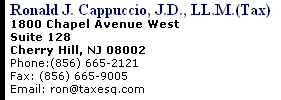|
Claim a Prorated Tax
Break |
If you’ve
been living in your home for awhile, you're
probably sitting on a tax gold mine. Not only are real
estate prices soaring in many areas, the tax law allows a
married couple filing jointly to pocket up to $500,000 of gain
without owing and federal income taxes from a home sale if
they have owned and used the home as a principal residence for
two out the previous five years. Unmarried or married
taxpayers filing separately can pocket a gain of up to
$250,000 without owing any federal income tax.
There is no limit on the number of times you can exclude
the gain on the sale of your principal residence as long as
you wait at least two years between sales and meet the
ownership and use tests.
|
More Than One Home? IRS regulations list several
factors that help determine which home is the principal
residence.
They include: the
amount of time the home is used; place of employment;
where other family members live; the address used for
tax returns, driver’s license, voter registration, bills
and correspondence; as well as the location of banks,
religious organizations and recreational
clubs. |
|
Special Tax Break for Military
Personnel
A
taxpayer on qualified official extended duty in the U.S.
Armed Services or the Foreign Service may suspend for up
to 10 years of such duty time the running of the 5-year
ownership-and-use period before the sale of a residence.
This applies when the duty station
is:
 At least 50 miles from the residence or At least 50 miles from the residence or
 While the person is residing under orders
in government housing. While the person is residing under orders
in government housing. |
What
if you don’t meet the two-out-of-five-year rule? Fortunately,
you may still qualify for a partial exclusion. IRS regulations
make it easy for many people to collect the tax break after
"premature" sales of their residences.
The regulations clarify the rules for certain “safe
harbors” the IRS has approved. Here’s a quick roundup:
- If you’re forced to move
due to a job change, you can claim a partial exclusion if
your new job is located at least 50 miles farther from the
old home than that home was from your old job.
- You can claim a partial
exclusion for “health reasons” if you’re selling the home
due to treatment of a specific illness or disease and the
move is recommended by a physician. The health condition
could involve you or a parent, child or other relative.
However, the move that causes the premature home sale cannot
be done merely to benefit your (or a family member's)
general health and well being.
- The regulations provide a
laundry list of unforeseen circumstances that could cause a
qualifying premature sale including destruction of a home by
a hurricane, divorce or separation and multiple births from
a single pregnancy. The triggering event must be one that
you “could not have reasonably anticipated.”
How much of the home sale
exclusion do you get after an eligible premature sale? You are
allowed a percentage of the regular $500,000 or $250,000
limit, depending on how much of the two-year ownership and use
test was satisfied.
Effective
dates: The regulations apply to sales
after August 12, 2004. But you might be able to take advantage
of an election to apply the rules retroactively to earlier
sales. Ask your tax adviser if you qualify to file an amended
return and claim a refund.

| | |
|




















































